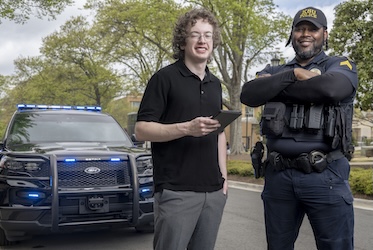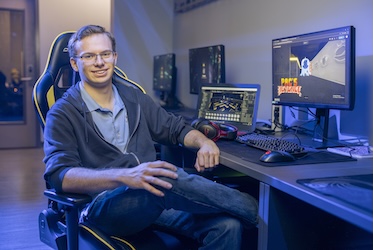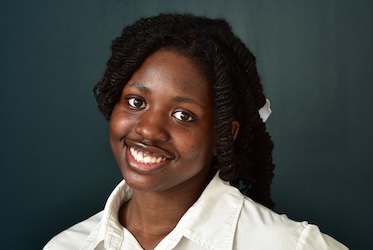
Going Global
MARIETTA, Ga. | May 31, 2019
Software engineering student selected for elite research program at CERN
Kennesaw State University’s Elisabeth Petit-Bois has spent most of her undergraduate career researching how humans can integrate artificial intelligence into everyday life. This summer, she will work to perfect her craft as she becomes one of 40 students across the globe and one of only two U.S. students to participate in the CERN openlab Summer Student Programme.
Petit-Bois, who is pursuing a software engineering degree in Kennesaw State’s College of Computing and Software Engineering, was selected from a pool of 1,660 students representing 19 countries. She will travel to CERN’s Genève, Switzerland headquarters on June 15 to take part in the nine-week program, in which she will use state-of-the-art computer technology and study its use in high-energy physics. The CERN openlab is a public-private partnership that works to develop cutting-edge information and computer technology solutions for scientific research.

In addition to research opportunities, students also attend a series of lectures given by information technology experts on advanced CERN-related topics and will take part in experiments and visit various CERN facilities, as well as other research laboratories and companies.
“When it came to summer research opportunities, I knew I wanted to find something that would allow me to explore human and computer interactions,” said Petit-Bois, who chose to attend KSU since it houses Georgia’s only undergraduate program in software engineering. “Applying to the CERN openlab program was a shot in the dark, but I’m so excited to be one of just two American students represented in this year’s cohort.”
A graduate of Dacula High School in Gwinnett County, Petit-Bois is a member of computing honor society Upsilon Pi Epsilon and the National Society of Black Engineers (NSBE). In November 2018, she won first place at the NSBE Fall Regional Conference for her poster presentation on “Genetic Algorithm-based Image and Segmentation using Markov Random Field Modeling,” besting presentations by students from Vanderbilt University, Auburn University and the Georgia Institute of Technology.
She has conducted research in KSU’s Center for Machine Vision and Security Research (CMVSR) lab alongside faculty and has interned at IBM’s Thomas J. Watson Research Center in Yorktown Heights, N.J. Petit-Bois intends to pursue graduate studies after receiving her degree in May 2020.
“Elisabeth is a calm and hard-working student who developed her research interests at a very early stage as an undergraduate student,” said Chih-Cheng Hung, professor of computer science. “She is an intelligent student, and I am confident that she will have a bright research career.”
– Travis Highfield
Photos by David Caselli
Related Stories

Kennesaw State to revive bathtub race tradition with new video game

Kennesaw State student develops AI tools to help first responders diagnose behavioral health issues

Kennesaw State computer game design student launches studio, first video game

Kennesaw State student integrates artificial intelligence into architectural design education
A leader in innovative teaching and learning, Kennesaw State University offers undergraduate, graduate, and doctoral degrees to its more than 47,000 students. Kennesaw State is a member of the University System of Georgia with 11 academic colleges. The university’s vibrant campus culture, diverse population, strong global ties, and entrepreneurial spirit draw students from throughout the country and the world. Kennesaw State is a Carnegie-designated doctoral research institution (R2), placing it among an elite group of only 8 percent of U.S. colleges and universities with an R1 or R2 status. For more information, visit kennesaw.edu.















